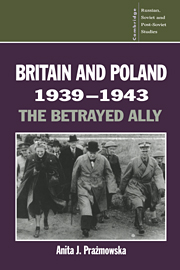Book contents
- Frontmatter
- Contents
- Preface
- Map
- 1 The formation of the Polish government-in-exile: ideology and war plans
- 2 Britain and German expansion in Eastern and South-eastern Europe
- 3 Britain's only fighting ally
- 4 Britain, Poland and the Soviet Union: June–December 1941
- 5 1942, year of disappointments
- 6 The illusion of an alliance ends
- 7 1943, the end of Polish–Soviet co-operation
- Conclusion
- Notes
- Bibliography
- Index
- Titles in the series
2 - Britain and German expansion in Eastern and South-eastern Europe
Published online by Cambridge University Press: 29 September 2009
- Frontmatter
- Contents
- Preface
- Map
- 1 The formation of the Polish government-in-exile: ideology and war plans
- 2 Britain and German expansion in Eastern and South-eastern Europe
- 3 Britain's only fighting ally
- 4 Britain, Poland and the Soviet Union: June–December 1941
- 5 1942, year of disappointments
- 6 The illusion of an alliance ends
- 7 1943, the end of Polish–Soviet co-operation
- Conclusion
- Notes
- Bibliography
- Index
- Titles in the series
Summary
In 1939 a war in Central and Western Europe could not be viewed by a British government as a conflict to which it should devote all of its military and economic potential. But German aggression in Europe clearly could and did pose a threat to Britain and its globally scattered interests. Nevertheless the defence of these would always involve the defence of imperial priorities, naval communications and economic links with British markets. The inevitable conclusion of this dilemma was a preference, at least in London, for seeing Europe primarily as a French effort to which the British would make a contribution, while proceeding with training and equipping its own army, which was not expected to be ready until 1941.
By the beginning of 1939 Britain took a direct interest in French plans against Germany and Italy. This concern was affirmed by the course of military planning and co-operation, pursued by the British and French military staffs since February 1939. By May plans for the despatch of the British Expeditionary Force to fight with the French in Europe evolved in greater detail. Not only were the French assured of the presence of thirty-two British divisions on French soil by the end of the second year of war, but these were also to be provided with the latest and best equipment.
Far more telling was an analysis of what the British had decided not to pledge to the European war.
- Type
- Chapter
- Information
- Britain and Poland 1939–1943The Betrayed Ally, pp. 28 - 53Publisher: Cambridge University PressPrint publication year: 1995

